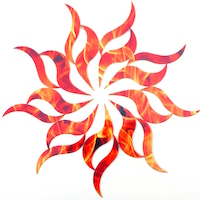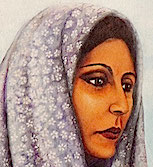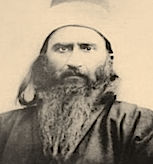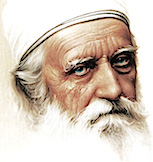

Tao Te Ching

Tamera Mulanix
Bahá'í (بهائی) Lineage
Persecuted since it’s beginning by adherents of belief and superstition; Bahá'í with it’s dedication to openness, reason, and direct experience has become the world’s fastest growing religion during the last 100 years, the second-most geographically widespread religion after Christianity, and the only one that has grown faster than the general population in every UN region spreading to over 200 countries. A new religion based on a Shambhala-like myth of a hidden good rising up in the future to overcome corruption and evil establishing a great golden age; it emphasizes the oneness of humanity, freedom from prejudice, gender equality, environmental protection and a universal unification of religion, politics, science and government.
People (4)

Táhirih طاهره (Fatimah Baraghani, "The Pure One")
1814 – 1852 CE
A genius-deep and curious mind living in a culture and with a husband who didn’t think women should read, be seen, or think for themselves; beautiful, educated, and from one of the most prominent families of her time, Tahirih is said to be the first woman to unveil and question Islamic political and religious orthodoxy which led to her imprisonment and execution. She rose above immense obstacles and became a famous poet, philosopher, and religious leader inspiring and organizing women to reject their oppression. “The first woman suffrage martyr,” her poems are still popular and her influence on Bábí, Bahá’í, and women’s rights are immense and continuing to this day.

Bahá'u'lláh بهاء الله, ("Glory of God")
1817 – 1892 CE
Founder of the Bahá'í Faith, persecuted, tortured, exiled and imprisoned for 40 years, considered a manifestation like Moses, the Buddha, Jesus and Muhammad; Bahá'u'lláh continued and expanded a tradition that had broken from Islam and started a new religion based on a Shambhala-like myth of a hidden good rising up in the future to overcome corruption and evil to establish a great golden age. He taught the unity of all mankind, all genuine religions, the equality of men and women, the compatibility of science and religion and that it is time now to create a global society with universal education, a bill of rights, respect for diversity, a democratically elected world government and collective security based on justice and equality with a world police force, language and currency.

Abdu’l-Bahá' ' عبد البهاء
1844 – 1921 CE
Left in poverty and exile at 8 years old when his father, Bahá'u'lláh (founder of the Bahá'í faith), was imprisoned and all his family’s possessions looted; Abdul Baha grew up in a Palestinian prison colony and after 40 years of imprisonment at age 64 was released giving him the opportunity to more effectively spread these teachings of social service, racial and gender equality, environmental protection and a universal unification of religion, politics, science and government. He was knighted by the British government for his humanitarian work during WWI and today Bahá'í has grown to over 8 million followers, become the world’s fastest growing religion during the last 100 years, the second-most geographically widespread religion after Christianity growing at least twice as fast as the population of almost every UN region.

Kahlil Gibran
1883 – 1931 CE
After Shakespeare and Laozi, Gibran is the third best-selling poet of all time. His friends included WB Yeats, Carl Jung and Auguste Rodin. Elvis Presley was deeply influenced by Gibran, read passages to his mother, made notes in the margins, and gave away copies of The Prophet to his friends. Johnny Cash was also a big fan and John Lennon adapted lines from his poetry into his songs.
{Maronite Christian, Bahá’í, Sufi}
The Prophet, Sand and Foam, The Earth Gods, The Broken Wings, Love Letters in the Sand.
Comments (0)